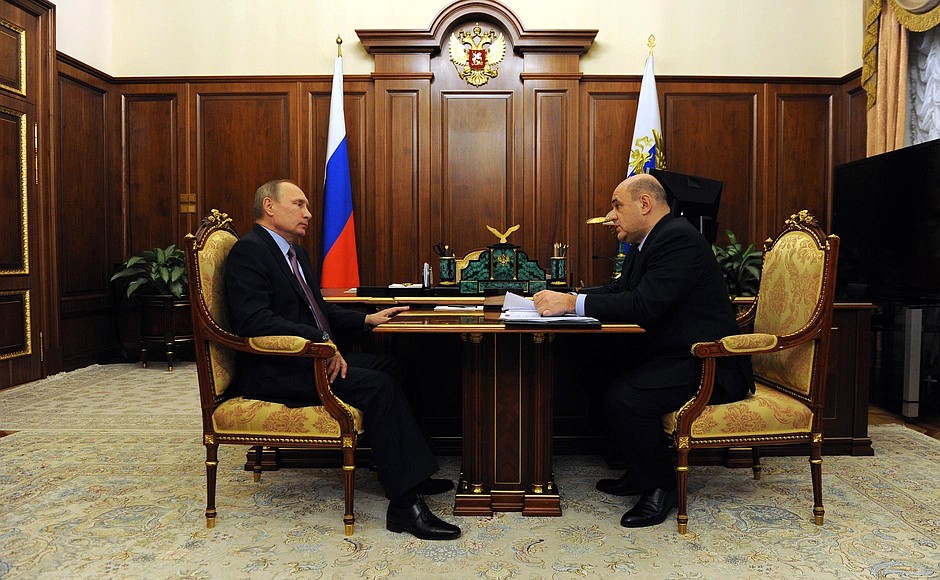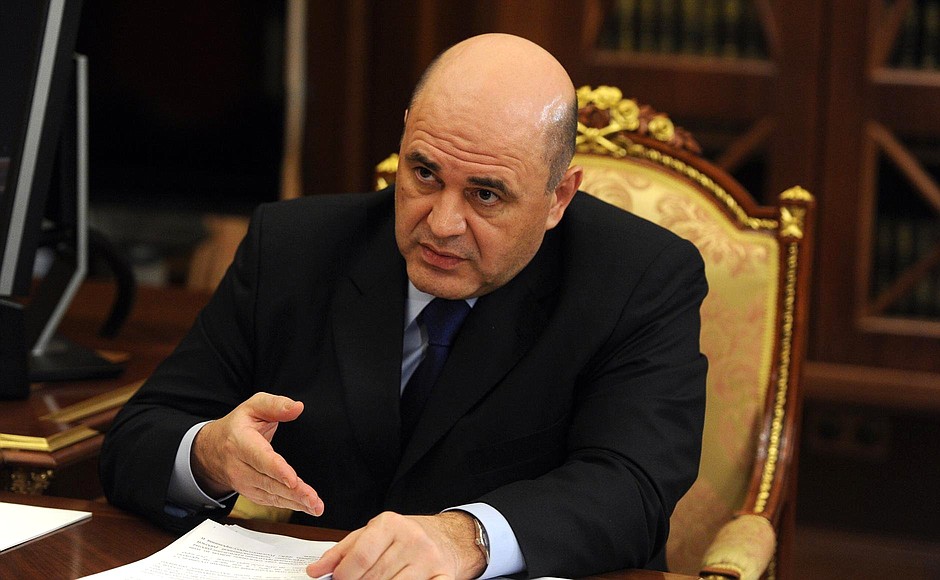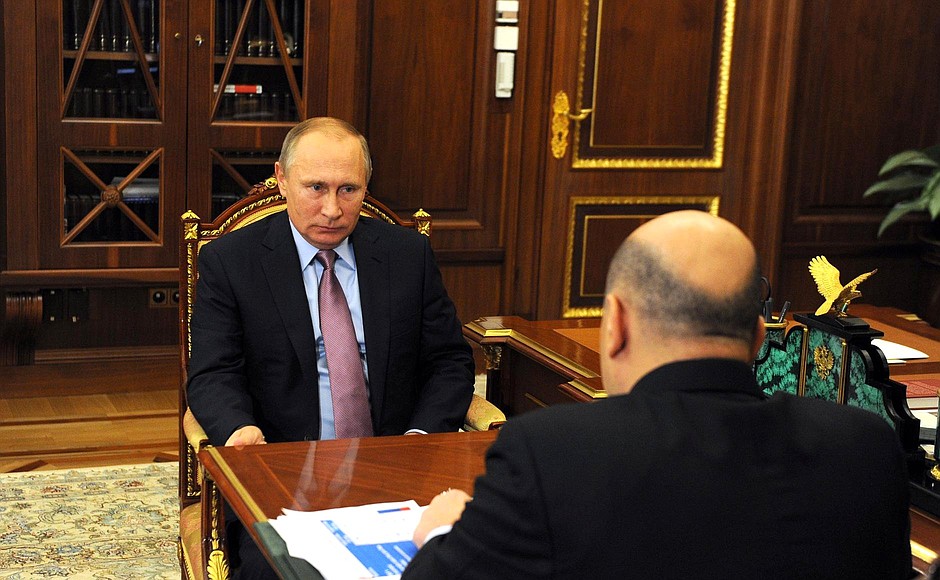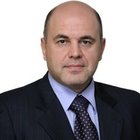The head of the Federal Taxation Service informed the President about its performance in the past ten months and implementation of the plan to establish a uniform system for administering tax and non-tax payments.
* * *
President of Russia Vladimir Putin: Mr Mishustin, we will of course discuss matters pertaining to the performance of the Taxation Service, one of the most important of which is to ensure tax collection, but first I would like to congratulate you on your professional holiday, Tax Worker’s Day, and to convey my best wishes to you and the staff of your agency. The Taxation Service is a key element of the government because it contributes so much to the country’s financial stability and the revenue part of the budget – together with the Customs – but still your service plays the main role in this respect.
I would like to wish you success.
Head of the Federal Taxation Service Mikhail Mishustin: Mr Putin, thank you for the greetings.
I will make a brief report on the current situation.
We have just summed up ten-month results on revenue collection rates for all levels of the budget. In the first half of the year we were concerned over some figures showing a 1.3 percent decline in the rate of incoming tax revenues as compared with the same period in 2015. However, we have since turned the corner. We have registered a 2.6 percent increase in revenues to the consolidated budget in the first ten months of 2016, which equals 300 billion rubles.
This increase was achieved by revenue generating taxes, primarily VAT. The growth rate is plus 8.6 percent. This was made possible by the work of the automated system of control over VAT reimbursement and integration with the Customs Service. I will tell you about this in more detail later.
Vladimir Putin: Is this what we wanted to achieve by bringing everything together under the aegis of the Finance Ministry?
Mikhail Mishustin: Yes. If you allow me, I will describe later how we are working on this on a more systematic basis, not only with the Customs.
The next revenue generator is the income tax. It has gone up by 7.6 percent or 2.3 trillion rubles. This also shows that salaries are moving to their former level.
Vladimir Putin: Salaries have increased a bit.
Mikhail Mishustin: Yes, this is absolutely true. I know the figure – plus 7.9 percent in nine months.
Then there is profit tax, which is also growing. At this point, we have the consolidated figure: profit tax grew by 2.9 percent compared to the first ten months of 2015 (including profit tax on dividends paid by major companies among others). There is a decrease, as profits in 2015 were not that large. However, today we can see that profit tax is growing by 7.4 percent at the 20 percent rate, which is an uptick in the regions.
Collection rates for the fixed excise duty, including on alcohol, are at a record high. Over the first 10 months of 2016, total excise duty amounted to 1.1 trillion rubles, which is a 26 percent increase compared to the same period in 2015, and a 25 percent increase for spirits.
This was also made possible by your instructions to create an interagency working group headed by Finance Minister Anton Siluanov, which involves the relevant law enforcement authorities, the Federal Service for Alcohol Market Regulation and the Tax Service. We worked hard on the accounting system for the alcohol industry.
I would like to say that we managed to eliminate a large-scale excise duty evasion scheme, and we are recording revenue growth in some regions, including a tenfold increase in the Republic of North Ossetia- Alania.
Vladimir Putin: A tenfold increase?
Mikhail Mishutin: Yes. In the Republic of North Ossetia – Alania, the growth over the corresponding previous period was about 300 million rubles, and now it is 3.1 billion rubles. In Kabardino-Balkaria, the increase is 40 percent. We can see that these dynamics also show that alcohol markets are coming out of the legal shadows.
Vladimir Putin: So, the measures taken in this area are producing results.
Mikhail Mishutin: Yes, they are.
The most important thing, Mr President, is the increase of 25 billion rubles for spirits for the corresponding period.
You spoke about creating a unified mechanism of tax and non-tax payment administration. In particular, you spoke about the customs service and integration. I would like to briefly report on the areas of work.
First, the integration itself with the Federal Customs Service’s information system. We are primarily interested in the fiscal effect. We have analysed related processes where tax and customs services overlap. There are about 90 such processes. We have conducted an analysis, following which we focused on the main vectors of our work in the following areas.
First, it is about obtaining information on the customs value of goods crossing the Russian border for further use in the automated control system for the purpose of value added tax refund. So, if someone wants to file for deductions or the like, we will see the entire chain from importing the goods, charging duties and fees all the way to retail sale. Importantly, we already have results. In particular, our combined credited amount following the receipt of information from the customs service stand at about 52 billion roubles. Customs have recorded a corresponding increase in the collection of their fees as well. We will continue this work, Mr President, this is just the beginning.
The second vector is represented by the risk management system. All foreign trade participants, which the customs service focuses on, are taxpayers as well. Just like the tax service, we see them as taxpayers with the corresponding risk, the risk of tax evasion.
The corresponding sharing of information gave us the opportunity to conduct coordinated inspections, but we always use the risk analysis model, that is, we come and explain the reason for coming and checking things. In this sense, too, work is underway, and we are pleased to see additional fiscal revenue without any increase in the corresponding taxes, fees or duties.
Insurance premiums are also about creating a single administrative mechanism. Starting on January 1, we will begin to administer insurance premiums, including the Social Development Fund, the Mandatory Medical Insurance Fund, and the Pension Fund.
I am here to say that we are prepared for the job. There will not be any changes for the taxpayers or employers. In addition, simplified reporting forms will be used. There will be four of them. One will be quarterly and will include all the calculations. We will have one controller, meaning that the offices will not have to go out and check the taxpayers. This was also in your instructions – to reduce the number of inspections. Basically, the administration of insurance premiums is similar to the imperative for administering personal income tax. Thus, we see this information base and will try to provide administration without unneeded inspections.
Finally, we hope that our citizens will be able to see the amounts credited to their insurance premiums when they sign in their respective online accounts. They will know how much their employer has paid for them to all the funds for the subsequent calculation of pension entitlements and they will be able to ask questions that they may have for the state.
The third point that I would like to report on is regarding your instruction to create legislative and enforcement measures for introducing the latest cashier’s desks for the tax service to have online access to retail transactions. Much has been done in this area. In accordance with your instruction and in conjunction with the Popular Front, we have done this work across the country working with business associations, such as Delovaya Rossiya, OPORA, the RUIE, and the Chamber of Commerce and Industry. Having worked through everything and addressed all the issues, the State Duma deputies adopted a law on cash register equipment in the summer. February 1 is approaching, when all newly registered cash register equipment (the cash registers, which, under the law, will be registered with the tax authorities) will follow the new procedure.
We have developed an online office. Now, you will not have to go to tax offices for paperwork. It is comforting to know that 40 such products have been manufactured, and the competition will be tough. It will reduce the cost of cash register equipment, which means reduced costs for businesses.
I hope that it will go fairly painlessly for businesses, but most importantly, all retail transactions will be transparent for the state. That way, we will cover the entire chain of goods entering Russia through the customs, then going through all conversion stages and sale at retail outlets. Finally, all tax receipts, including from those taxpayers who use the simplified online tax return filing system, will become transparent for the state. Put differently, we will no longer have to check them as we will see everything from the documents.
In a nutshell, Mr President, these are the results.
Vladimir Putin: Good.
<…>



